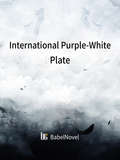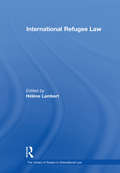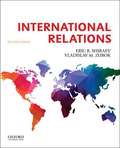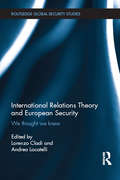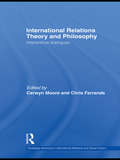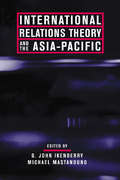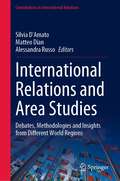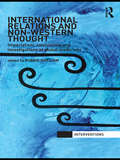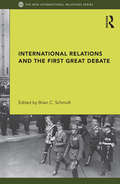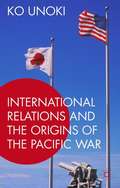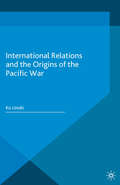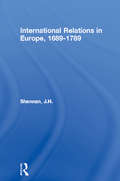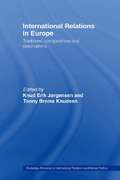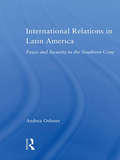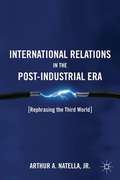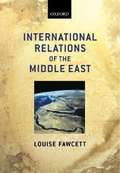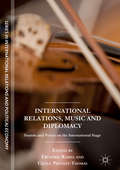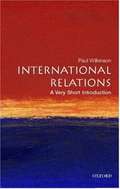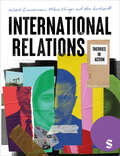- Table View
- List View
International Purple-White Plate: Volume 1 (Volume 1 #1)
by Ju MenIn the early period of the Republic of China, the monks Rufeng and faming, who were in charge of protecting the state temple in Beijing, were chivalrous and righteous. I have a lot of experience in the Jianghu. Rufeng and faming led the monks to fight for life and death with the Japanese secret agents of the Black Dragon Society and the Japanese Kanto army who were rampant all over China at that time.
International Purple-White Plate: Volume 2 (Volume 2 #2)
by Ju MenIn the early period of the Republic of China, the monks Rufeng and faming, who were in charge of protecting the state temple in Beijing, were chivalrous and righteous. I have a lot of experience in the Jianghu. Rufeng and faming led the monks to fight for life and death with the Japanese secret agents of the Black Dragon Society and the Japanese Kanto army who were rampant all over China at that time.
International Purple-White Plate: Volume 3 (Volume 3 #3)
by Ju MenIn the early period of the Republic of China, the monks Rufeng and faming, who were in charge of protecting the state temple in Beijing, were chivalrous and righteous. I have a lot of experience in the Jianghu. Rufeng and faming led the monks to fight for life and death with the Japanese secret agents of the Black Dragon Society and the Japanese Kanto army who were rampant all over China at that time.
International Purple-White Plate: Volume 4 (Volume 4 #4)
by Ju MenIn the early period of the Republic of China, the monks Rufeng and faming, who were in charge of protecting the state temple in Beijing, were chivalrous and righteous. I have a lot of experience in the Jianghu. Rufeng and faming led the monks to fight for life and death with the Japanese secret agents of the Black Dragon Society and the Japanese Kanto army who were rampant all over China at that time.
International Refugee Law
by Hélène LambertThe essays selected and reproduced in this volume explore how international refugee law is dynamic and constantly evolving. From an instrument designed to protect mostly those civilians fleeing the worse excesses of World War II, the 1951 Refugee Convention has developed into a set of principles, customary rules, and values that are now firmly embedded in the human rights framework, and are applicable to a far broader range of refugees. In addition, international refugee law has been affected by international humanitarian law and international criminal law (and vice versa). Thus, there is a reinforcing dynamic in the development of these complementary areas of law. At the same time, in recent decades states have shown a renewed interest in managing migration, thereby raising issues of how to reconcile such interests with refugee protection principles. In addition, the emergence of concepts of participation and responsibility to protect promise to have an impact on international refugee law.
International Relations
by Vladislav M. Zubok Eric B. ShiraevUsing a three-part framework of Ideas, Arguments, and Contexts and Applications, International Relations, Second Edition, shows students how to think critically about issues and current events in world politics. Each chapter first describes key concepts and developments in the field (Ideas), then presents the main theoretical and analytical approaches (Arguments), and finally applies the main theories and approaches within the individual, state, and global contexts (Contexts and Applications). Historical information is woven throughout the text, and every chapter ends with an extended case study ("The Uses of History") that demonstrates how what we have learned from the past can influence our future actions. Three full chapters on key approaches--realism (chapter 2), liberalism (chapter 3), and constructivism and other alternative views (chapter 4)--introduce students to a broad spectrum of approaches, and each chapter integrates discussions of relevant theories and levels of analysis. Visual Reviews at the end of each chapter not only recap key points but include Critical Thinking questions that reflect the chapter learning objectives.
International Relations Theory and European Security: We Thought We Knew (Routledge Global Security Studies)
by Andrea Locatelli Lorenzo CladiThis book engages with key contemporary European security issues from a variety of different theoretical standpoints, in an attempt to uncover the drivers of foreign policy and defence integration in the EU. Although European foreign policy has been attracting an ever-increasing number of International Relations (IR) scholars since the end of the Cold War, consensus on what drives European foreign policy integration has not yet emerged. This book seeks to encourage debate on this issue by examining a wide range of high-profile security issues which have roused significant interest from policy makers, academics and the public in recent years. The volume discusses, amongst other issues, the strategic posture of the European Union as a security actor, the troubled relationship with Russia, the debate regarding France’s relations with the US following France’s rapprochement with NATO and the EU’s influence in the Israeli-Palestinian conflict. The collective intent of the contributors to highlight the drivers of EU foreign policy and defence integration ties together the wide variety of topics covered in this volume, forming it into a comprehensive overview of this issue. By paying considerable attention not just to the internal drivers of EU cooperation, but also to the critical role played by the US as an incentive or obstacle to European security, this book presents a unique contribution to this field of debate. This book will be of much interest to students of European security, IR theory, Transatlantic Relations, European politics and EU foreign policy.
International Relations Theory and Philosophy: Interpretive dialogues (Routledge Advances in International Relations and Global Politics)
by Cerwyn MooreThis book discusses the contribution of philosophers and thinkers whose ideas have recently begun to permeate international relations theory. It provides an introduction to the contemporary debates regarding theories and methodologies used to study international relations, particularly the relationships between interpretive accounts of social action, European philosophical traditions, hermeneutics and the discipline of international relations. The authors provides a platform for dialogue between theorists and researchers engaged in a more specific area studies, geo-political studies, political theory and historical accounts of international politics. The volume analyzes a variety of theoretical and explores the work of Nietzsche, Heidegger, Gramsci, Wittgenstein, Gadamer, Levinas, Bakhtin, Patocka, Derridean, Deleuze and Susan Sontag. Making an important contribution to discussions about how to study the complexities of world politics, this book will be of interest to students and researchers of international relations, politics, sociology, philosophy and political theory.
International Relations Theory and the Asia-Pacific
by Michael Mastanduno G. John. Ikenberry Eds.What will the Asia-Pacific rim look like in the years ahead? What tools will international relations theorists need to understand the complex relationship among China, Japan, and the United States as the three powers shape the economic and political future of this crucial region?Some of the best and most innovative scholars in international relations and Asian area studies gather here with the working premise that stability in the broader Asia-Pacific region is in large part a function of the behavior of, and relationships among, these three major powers. Each author analyzes the foreign policy behavior of one or more of these states and/or relations among them in an effort to make claims about the prospects for regional stability. Some of the chapters focus on security relationships, some on economic relations, and some on the interaction of the two. The authors do not promote any particular theoretical perspective, but instead draw on the full diversity of theoretical approaches in contemporary international relations scholarship to illuminate international interactions among the Pacific powers.The creative collaboration of international relations and Asian studies specialists presents the opportunity to assess the applicability of Western categories of analysis to the beliefs and behaviors of Asian actors. The scholars in this volume share the conviction that a deeper understanding of the effects of cultural divides between Asian and American policymakers is essential if the Pacific rim's economic and regional security is to be safeguarded.
International Relations Theory and the Asia-Pacific
by Michael Mastanduno G. John. IkenberryWhat tools will international relations theorists need to understand the complex relationship among China, Japan, and the United States as the three powers shape the economic and political future of this crucial region? Some of the best and most innovative scholars in international relations and Asian area studies gather here with the working premise that stability in the broader Asia-Pacific region is in large part a function of the behavior of, and relationships among, these three major powers.
International Relations and Area Studies: Debates, Methodologies and Insights from Different World Regions (Contributions to International Relations)
by Matteo Dian Alessandra Russo Silvia D'AmatoDiscover the intricate tapestry of international politics and governance with this book. The book delves into the diverse nature of globally significant actors and systems across multiple regions. From Africa to Asia, Europe to the Middle East, this collection of thought-provoking case studies explores the role of regional actors in the international system. Combining theoretical innovation with empirical analysis, this volume expands the boundaries of International Relations (IR) and Area Studies (AS), showcasing their interconnections throughout history and in contemporary contexts. Through illuminating case studies drawn from the fields of "Comparative Regionalism" and "Non-Western IR Theory," the book sheds light on pressing international events. Unpacking complex questions, the contributors examine the application of IR scholarship to global events and provide fresh insights into political dynamics, conflicts, and state instability across various regions. By offering a comparative perspective on threats, political contestation, and security policies, this book challenges existing perspectives and enriches the debate. With its methodological and epistemological explorations, this book is an indispensable resource for scholars and students of international relations and security studies, as well as researchers focusing on specific world areas. Embark on a captivating journey through the multifaceted landscape of global affairs.
International Relations and Non-Western Thought: Imperialism, Colonialism and Investigations of Global Modernity (Interventions)
by Robbie ShilliamInternational Relations, as a discipline, tends to focus upon European and Western canons of modern social and political thought. Alternatively, this book explores the global imperial and colonial context within which knowledge of modernity has been developed. The chapters sketch out the historical depth and contemporary significance of non-Western thought on modernity, as well as the rich diversity of its individuals, groups, movements and traditions. The contributors theoretically and substantively engage with non-Western thought in ways that refuse to render it exotic to, superfluous to or derivative of the orthodox Western canon of social and political thought. Taken as a whole, the book provides deep insights into the contested nature of a global modernity shaped so fundamentally by Western colonialism and imperialism. Now, as ever, these insights are desperately needed for a discipline that is so closely implicated in Western foreign policy making and yet retains such a myopic horizon of inquiry. This work provides a significant contribution to the field and will be of great interest to all scholars of politics, political theory and international relations theory.
International Relations and the First Great Debate (New International Relations)
by Brian C. SchmidtThis book provides an authoritative account of the controversy about the first great debate in the field of International Relations. Of all the self-images of International Relations, none is as pervasive and enduring as the notion that a great debate pitting idealists against realists took place in the 1940s. The story of the first great debate continues to structure the contemporary identity of International Relations, yet in recent years revisionist historians have challenged the conventional wisdom that the field experienced such a debate. Drawing on expert contributors working in Canada, Europe, the United Kingdom, and the United States, this book includes key participants in the historiographical controversy. The book assembles the existing scholarship and provides a thorough analysis of the status of the first great debate in the history of International Relations. It is an invaluable examination of the causes and future direction of idealist and realist arguments. International Relations and the First Great Debate will be of interest to students and scholars concerned with the foundations of International Relations.
International Relations and the Origins of the Pacific War
by Ko UnokiInternational Relations and the Origins of the Pacific War takes the unique approach of examining the history of the relationship between Japan and the United States by using the framework of international relations theories to search for the origins of the Pacific War, that erupted with Japan's attack on Pearl Harbour in 1941.
International Relations and the Origins of the Pacific War
by Ko UnokiInternational Relations and the Origins of the Pacific War takes the unique approach of examining the history of the relationship between Japan and the United States by using the framework of international relations theories to search for the origins of the Pacific War, that erupted with Japan's attack on Pearl Harbour in 1941.
International Relations in Europe, 1689-1789 (Lancaster Pamphlets)
by J. H. ShennanShennan examines the changing criteria upon which European relations were based between 1689 and 1789, a complex period which saw: * the decline of dynasticism * the emergence of economic power as a concomitant of military might * the growth of British influence * the dawn of nationalism For easy reference, this book also contains extensive chronologies of the important battles, treaties and alliances of the period, along with a list of further reading.
International Relations in Europe: Traditions, Perspectives and Destinations (Routledge Advances in International Relations and Global Politics #Vol. 44)
by Knud Erik Jørgensen Tonny Brems KnudsenA new and illuminating critical examination of international relations in Europe. This new volume presents all of the state of the art thinking, focusing particularly on international relations theory and theoretical debates in Western and Central European countries.The contributors seek to strengthen knowledge about different ways of cultivating the discipline; to intensify pan-European communication concerning IR theory; to contribute to improving the quality of theorizing; and finally to consider future directions for the discipline in Europe. The main issues addressed include: the historical development of the discipline; factors driving IR theorizing; the institutional and cultural context of theorizing; 'homegrown' theory-building vs. theory import; patterns of traditional and new discourse; and the diversity of disciplinary traditions.
International Relations in India
by Kanti P. Bajpai Siddharth MallavarapuThis reader is a collection of first-rate theoretical engagements relating to International Relations from across India.
International Relations in Latin America: Peace and Security in the Southern Cone
by Andrea OelsnerThis work studies the development of bilateral relations in two pairs of states (dyads): Argentina-Brazil and Argentina-Chile. It takes on a moderate constructivist approach that incorporates into the analysis of international relations the role of identities, ideas and perceptions as well as of material forces, and understands that the former are affected and changed during interaction. It also uses to securitization theory to explain how issues come or cease to be considered security matters through social constructions.
International Relations in the Post-Industrial Era
by Jr. Arthur A. NatellaThe current emphasis on the greening of the world marks a beginning of a new concern for our relationship with our planet. This book states that we are entering into a new era - a transitional time in history in which the values of the industrial revolution are being replaced by a post-industrial consciousness.
International Relations of the Middle East
by Louise FawcettThis book aims to provide the reader with a comprehensive, yet accessible guide for understanding the International Relations of the Middle East in the last century. Few parts of the world have been quite so buffeted by conflict and war; few parts of the world so much written about and debated in recent times, while at the same time remaining so subject to misunderstanding and stereotype. As one scholar wrote, reflecting on the legacy of fifty years of academic study of the region: 'Middle Eastern political processes defy observation, discourage generalization and resist explanation' (Bill 1996: 503). This volume is designed to improve our understanding of the Middle East by contemplating its International Relations in broad terms. These two subject areas, International Relations and Middle East politics, are highly interdependent, as even a cursory survey of major works shows. No book on the Middle East can afford to ignore the way that external forces have shaped the development of the region's politics, economics and societies, or indeed how the region itself has contributed to frame and shape the global environment. Similarly, no International Relations text can afford to ignore the rich case studies that the Middle East has supplied, and how they illuminate different theories and concepts of the discipline. It is a surprising feature of the literature, that despite advances in recent years, relatively little work has been done to bring these subject areas closer together. While other regions of the world appear to have been more susceptible to such exercises, Middle East Studies and International Relations continue to stand apart in an uneasy and often unfamiliar relationship (Tessler et al. 1999). Also taken from book.
International Relations, Music and Diplomacy
by Frédéric Ramel Cécile Prévost-ThomasThis volume explores the interrelation of international relations, music, and diplomacy from a multidisciplinary perspective. Throughout history, diplomats have gathered for musical events, and musicians have served as national representatives. Whatever political unit is under consideration (city-states, empires, nation-states), music has proven to be a component of diplomacy, its ceremonies, and its strategies. Following the recent acoustic turn in IR theory, the authors explore the notion of “musical diplomacies” and ask whether and how it differs from other types of cultural diplomacy. Accordingly, sounds and voices are dealt with in acoustic terms but are not restricted to music per se, also taking into consideration the voices (speech) of musicians in the international arena.Read an interview with the editors here: https://www.sciencespo.fr/ceri/en/content/international-relations-music-and-diplomacy-sounds-and-voices-international-stage
International Relations: A Very Short Introduction
by Paul WilkinsonOf undoubtable relevance today, in a post-9-11 world of growing political tension and unease, this Very Short Introduction covers the topics essential to an understanding of modern international relations. Paul Wilkinson explains the theories and the practice that underlie the subject, and investigates issues ranging from foreign policy, arms control, and terrorism, to the environment and world poverty. He examines the role of organizations such as the United Nations and the European Union, as well as the influence of ethnic and religious movements and terrorist groups which also play a role in shaping the way states and governments interact. This up-to-date book is required reading for those seeking a new perspective to help untangle and decipher international events.
International Relations: Theories in Action
by Hubert Zimmermann Milena Elsinger Alex BurkhardtThe definitive applied theory textbook that helps you make sense of global issues through theoretical concepts. Not presupposing any prior knowledge, this introduction equips you with the skills to use theories as adaptable tools to tackle complex global issues. Adopting a critical and questioning approach, you will be equipped in theory as a series of tools to be used, adapted, combined, and applied when grappling with some of the most contested issues in global politics. Theoretical perspectives are brought alive as a vital tool to understand concrete historical and contemporary examples. This indispensable text starts by examining key theories spanning constructivism and postcolonialism to realism and liberalism with a real-world perspective which prioritises empirical purchase. From here, chapters take a critical, questioning approach to tackle core problems of international politics – from armed conflict and financial markets to the climate crisis, global inequality, gender and race. This text is the ideal companion for all undergraduate and postgraduate students of global affairs. Hubert Zimmermann is Professor of International Relations at Philipps University of Marburg, Germany. Milena Elsinger is Head of the student information department at Philipps University of Marburg, Germany. Alex Burkhardt teaches at the Bundessprachenamt in Koblenz, Germany and previously taught at Philipps University Marburg, Germany.
International Relations: Theories in Action
by Hubert Zimmermann Milena Elsinger Alex BurkhardtThe definitive applied theory textbook that helps you make sense of global issues through theoretical concepts. Not presupposing any prior knowledge, this introduction equips you with the skills to use theories as adaptable tools to tackle complex global issues. Adopting a critical and questioning approach, you will be equipped in theory as a series of tools to be used, adapted, combined, and applied when grappling with some of the most contested issues in global politics. Theoretical perspectives are brought alive as a vital tool to understand concrete historical and contemporary examples. This indispensable text starts by examining key theories spanning constructivism and postcolonialism to realism and liberalism with a real-world perspective which prioritises empirical purchase. From here, chapters take a critical, questioning approach to tackle core problems of international politics – from armed conflict and financial markets to the climate crisis, global inequality, gender and race. This text is the ideal companion for all undergraduate and postgraduate students of global affairs. Hubert Zimmermann is Professor of International Relations at Philipps University of Marburg, Germany. Milena Elsinger is Head of the student information department at Philipps University of Marburg, Germany. Alex Burkhardt teaches at the Bundessprachenamt in Koblenz, Germany and previously taught at Philipps University Marburg, Germany.
